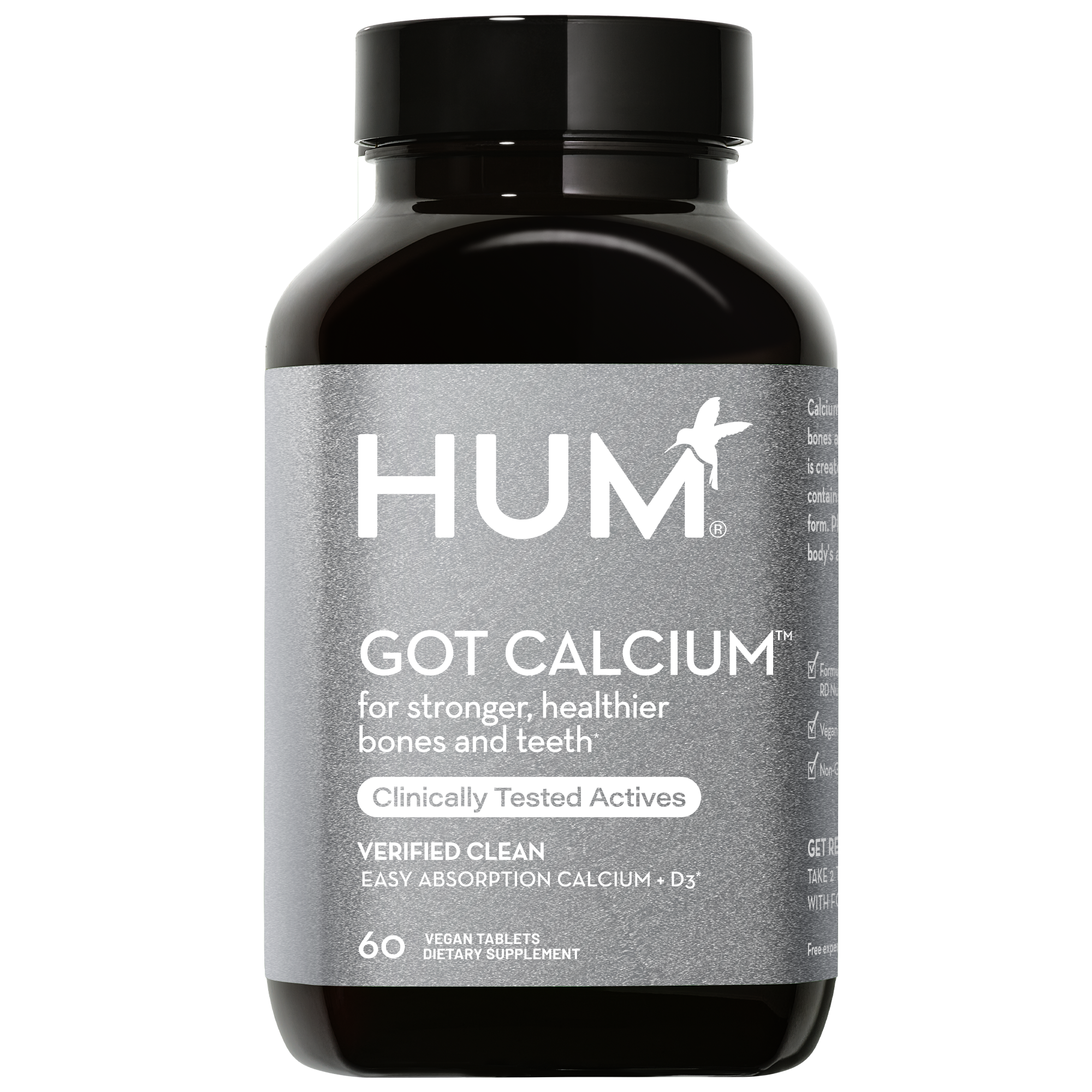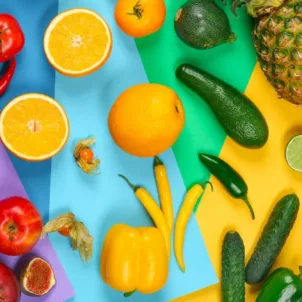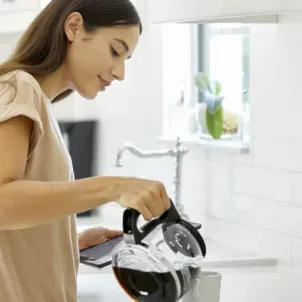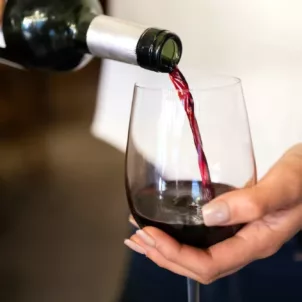Medically Reviewed By
Gaby Vaca-Flores, RDN, CLE
Registered Dietitian Nutritionist
Yearning for a brighter smile? Learn what causes yellow teeth and how to prevent tooth stains safely and effectively.
As we age, certain things are bound to happen. While some developments are inevitable, you can take action to prevent certain scenarios associated with signs of aging, such as yellow teeth.
In a world seemingly obsessed with cosmetics, teeth that are less than pearly white teeth are often looked down upon. In fact, in a 2013 survey, 89 percent of members of the American Association of Orthodontists reported that their patients requested tooth whitening procedures.
But why is tooth discoloration such a major concern? Is it purely esthetics, or can it indicate an underlying issue or even cause new ones?
With these questions in mind, we chatted with two oral health experts about everything there is to know about tooth stains and yellowing, including how to prevent both.


What causes yellow teeth?
According to Jennifer Jablow, DDS, a celebrity dentist and the creator of IntelliWHiTE, both extrinsic and intrinsic factors can cause tooth discoloration.Extrinsic Stains
“Extrinsic stains are more commonly known stains caused by certain foods, drinks, or smoking,” she explains. They can cause staining because teeth have a porous surface. “We eat and drink staining compounds every day,” Dr. Jablow says, pointing out why regular brushing is so imperative. “Staining compounds from food and drinks (called chromogens) build up on the surface of the tooth.” Other stain-promoting compounds from food and beverages include acid and tannins. Together, Dr. Jablow says that these factors can make teeth look yellow or even brown. Foods and drinks that can cause teeth to yellow and stain include:- coffee
- red wine
- sodas and energy drinks with added color
- darkly pigmented fruits
- acidic sauces and condiments
Intrinsic Stains
On the other hand, intrinsic staining occurs from the dentin (inner layer) of teeth. “The dentin darkens and it’s hard to change the color,” Dr. Jablow says. “These kinds of stains can be yellow or brown, but they can also be gray or white.” Most often, Dr. Jablow says that this kind of staining can occur from injury, medications, and thinning of the enamel from age.
Can you easily fix yellow teeth?
In short, this answer depends on the type of stain you have. “Extrinsic stains can be removed by a chemical reaction with peroxide that breaks the bonds of the chromogen, rendering them colorless,” Dr. Jablow explains. To break up extrinsic stains daily, she suggests using the IntelliWHiTE Power Boost Daily Whitening Gel, which you can add to your toothpaste. Conversely, she notes that “intrinsic stains are much harder to change and usually need porcelain veneers, crowns, or bonding.”Should you try natural ways to whiten teeth?
The internet is teeming with tips and natural ways to whiten teeth, such as by using:- lemon juice
- apple cider vinegar
- baking soda
How to Prevent Tooth Stains and Yellowing
All things considered, your best bet to whiten teeth naturally is to prevent straining in the first place. Here are six ways to help prevent yellowing and other kinds of discoloration through habits and lifestyle choices.1. Drink dark liquids through a straw
Dr. Jablow says that drinking through a straw will help limit contact between staining drinks and your teeth.2. Rinse after consuming staining foods
To help dilute any potential staining compounds and prevent them from setting into the porous surface of teeth, Dr. Jablow recommends rinsing your mouth with water after you consume any foods or drinks that contribute to staining.3. Eat Strategically
“Try eating a salad or dark greens (like kale or spinach) before drinking or eating a staining food. This will help create a film over the teeth to lessen stain penetration,” Dr. Jablow says. Similarly, she says that following staining foods with crunchy, healthy foods can help. She shares a few fruits and vegetables that can “act like a natural toothbrush,” such as:- apples
- pears
- celery
- carrots
- cauliflower
- cucumbers
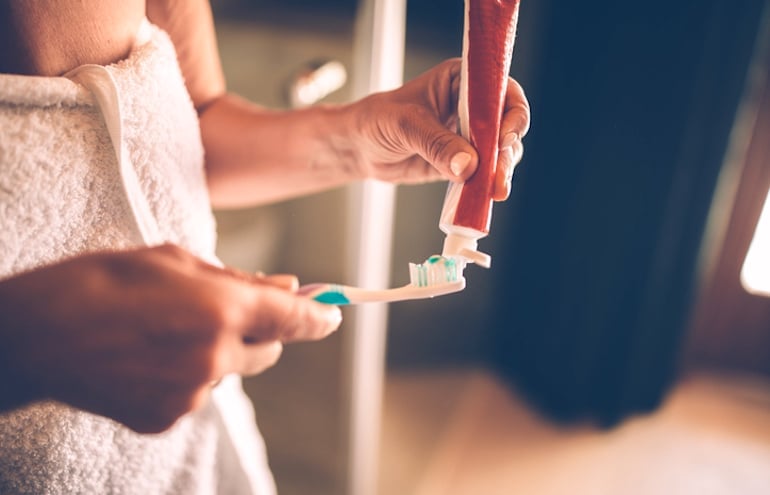
4. Be Careful with Harsh “whitening” toothpastes
Dr. Jablow points out that toothpastes claiming to whiten teeth don’t actually do so. Instead, she shares that they only remove surface stains. At any rate, she urges being cautious with them since they’re “loaded with harsh abrasives.” Nanne agrees. “I recommend Curaprox Black is White Toothpaste to my patients,” she says, noting that it has a very low relative dentin abrasivity value compared to many other toothpastes on the market.5. Invest in an Electronic Toothbrush
Lastly, Nanne shares that sonic electric toothbrushes are more effective than manual ones at removing extrinsic dental stains. If yellow teeth are one of your biggest gripes, buying a high-quality electronic toothbrush could very well be worth the investment.6. Follow a Solid Dental Hygiene Routine
On a parting note, Nanne’s advice is simple: “The best thing you can do for your teeth to keep them shiny and white is brushing twice a day, flossing or use interdental brushes daily, visiting your dental hygienist twice a year, and limiting foods that stain your teeth.” In sum, implement the tips above to achieve your brightest, whitest smile yet without risking tooth sensitivity or damage.More like this
